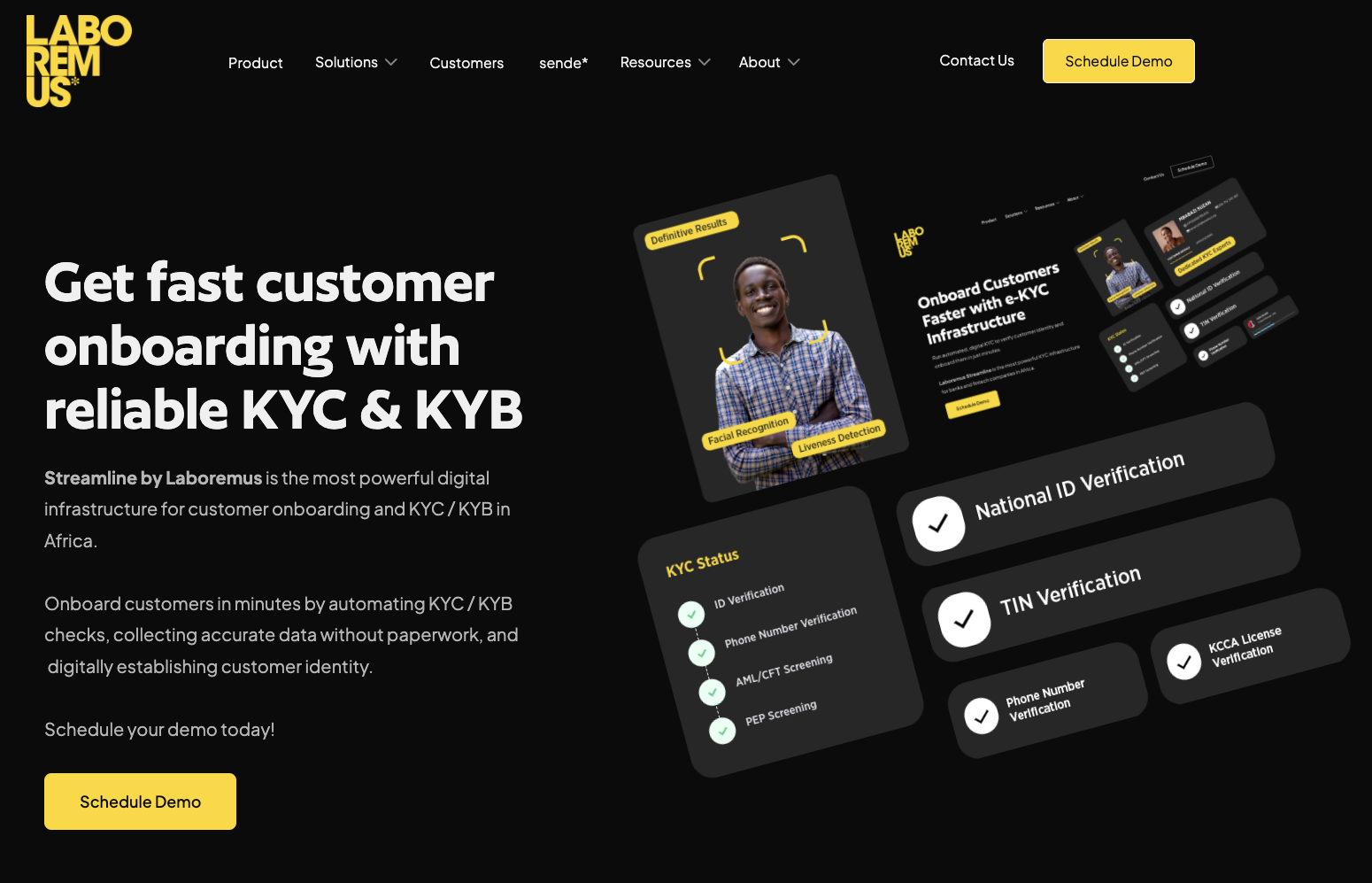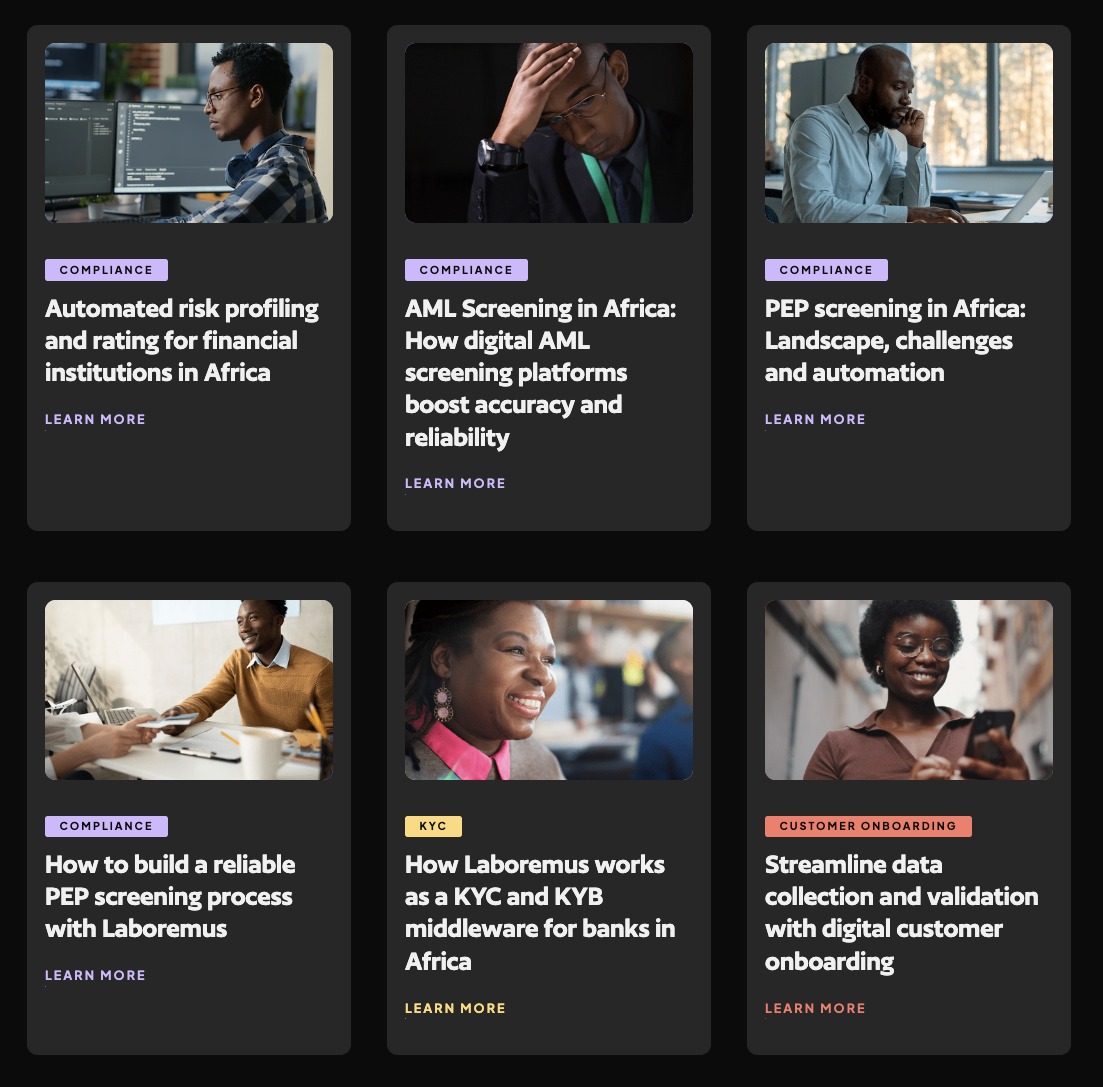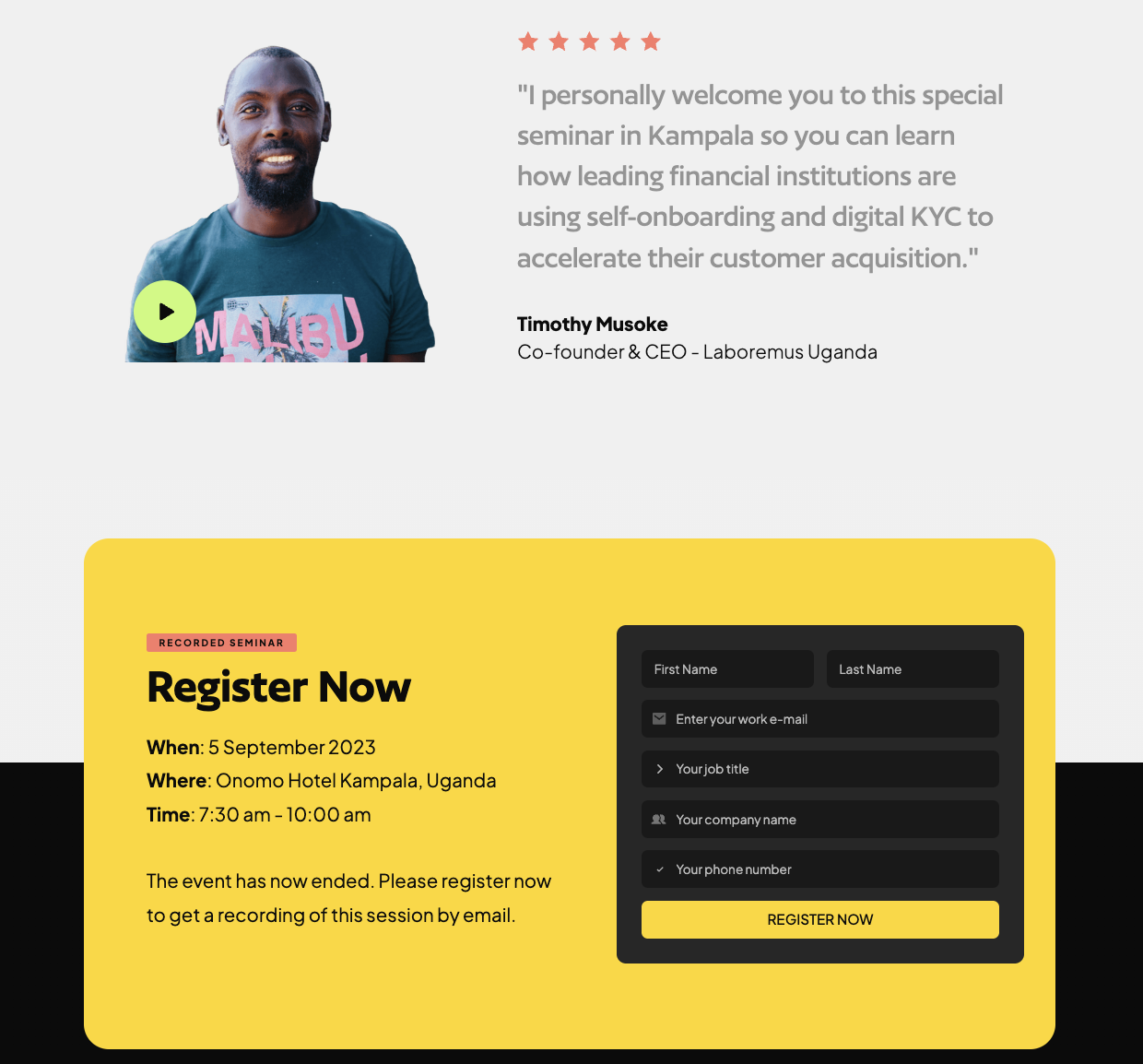Case Study: Laboremus: - Growing From Basic Marketing to 70 Enterprise Leads in 6 Months
November 11, 2025


Case Study: Laboremus: - Growing From Basic Marketing to 70 Enterprise Leads in 6 Months
Executive Summary
This case study examines how Laboremus, a Uganda-based KYC automation provider, transformed from having minimal marketing presence into becoming the recognized leader in digital identity verification for African financial institutions. Through comprehensive brand repositioning, website transformation, event strategy, and marketing infrastructure development, Laboremus established itself as "the most powerful digital KYC and KYB infrastructure for financial institutions in Africa."
The engagement centered on translating complex technical capabilities into clear value propositions for traditional African banks, building a professional digital presence, and creating sustainable demand generation systems. Within six months, Laboremus generated 70+ qualified leads from major African banks, established partnerships with Bank of Uganda and Uganda Bankers Association, and created the foundation for serving clients including Standard Chartered, Equity Bank, and dfcu Bank.
1. Client Background & Market Context
The CompanyLaboremus emerged as a B2B fintech building the most powerful KYC and KYB platform for financial institutions in Africa, helping banks and fintechs onboard customers in minutes by automating KYC checks and digitally establishing customer identity. Founded by a team with both European fintech experience and deep understanding of African market dynamics, Laboremus positioned itself at the intersection of advanced technology and local market needs.
Product: Streamline PlatformStreamline by Laboremus became the digital KYC solution trusted by The Bank of Uganda and top financial institutions, directly verifying customer information with several government registries via the NITA data hub. The platform offered:
- Instant Identity Verification: Real-time validation against NIRA (National Identification & Registration Authority) database
- Multi-Channel Onboarding: Support for Web, Mobile App, WhatsApp, USSD channels
- KYB Capabilities: Business verification including TIN, trade licenses, shareholder information
- AML/PEP Screening: Compliance with anti-money laundering and politically exposed persons regulations
- API Integration: REST API for seamless integration with existing banking systems
- Biometric Verification: Fingerprint matching against national ID records
Market OpportunityAfrican banks are the least efficient globally and struggle to offer cost-effective services to most of the continent's population, with new entrants such as fintechs struggling to scale due to lack of access to Know Your Customer data. The market presented massive opportunity:
- Financial Inclusion Gap: 66% of Sub-Saharan Africa's population remained unbanked
- Manual Processes: Most banks still using paper-based KYC taking days or weeks
- Regulatory Pressure: Increasing compliance requirements from central banks
- Digital Transformation: Banks investing heavily in digital infrastructure
- Mobile-First Population: 46% mobile penetration creating new onboarding channels
Strategic PartnershipsBank of Uganda (BoU), in collaboration with Uganda Bankers' Association (UBA) and Financial Sector Deepening Uganda (FSDU) signed a contract with Laboremus to develop a digital ID verification system for all banks and licensed financial service providers. This government endorsement provided unmatched credibility.
Competitive LandscapeLaboremus faced competition from:
- International Players: Global KYC providers trying to enter Africa
- Regional Competitors: Local fintech startups with basic solutions
- In-House Development: Banks building their own systems
- Manual Processes: The biggest competitor was the status quo
2. The Marketing Challenge
Despite having a transformative product with government backing, Laboremus faced significant go-to-market challenges.
Team Composition GapsThe founding team brought deep technical and local market expertise but lacked:
- B2B Marketing Experience: No one on the team had marketed to enterprise banks
- SaaS Marketing Knowledge: Unfamiliarity with modern digital marketing approaches
- Content Creation Skills: Unable to articulate value in marketing terms
- Event Management Experience: No experience running professional B2B events
Traditional Market DynamicsAfrica's banking sector presented unique challenges:
- Conservative Decision-Making: Banks resistant to change from manual processes
- Relationship-Based Sales: Heavy reliance on personal connections over digital marketing
- Trust Requirements: Need for exceptional credibility in financial services
- Education Gap: Low understanding of digital KYC benefits
- Infrastructure Concerns: Skepticism about digital solutions in emerging markets
Messaging DisconnectThe team struggled to communicate value:
- Technical Jargon: Talking about APIs and databases rather than business outcomes
- Feature-Focused: Listing capabilities instead of solving business problems
- Missing ROI Story: No clear articulation of financial benefits
- Lack of Social Proof: Customer success stories not being leveraged
Limited Marketing InfrastructureStarting position revealed critical gaps:
- Basic Website: Simple site that didn't convey professionalism or capability
- No Lead Generation: No mechanisms for capturing or nurturing prospects
- Absent CRM/Marketing Automation: No systems for managing customer relationships
- No Content Library: Despite deep expertise, no educational materials
- Minimal Social Presence: LinkedIn company page with negligible following

3. Strategic Approach & Methodology
Core Strategic Principles
1. Education-First Market DevelopmentGiven the traditional nature of African banking, we prioritized education:
- Demonstrate ROI through concrete case studies
- Explain digital transformation in familiar terms
- Address security and reliability concerns upfront
- Show peer adoption to create FOMO
2. Trust Through AssociationLeverage partnerships for credibility:
- Prominently feature Bank of Uganda partnership
- Highlight Uganda Bankers Association endorsement
- Showcase blue-chip client logos
- Use government registry integration as trust signal
3. Multi-Channel EngagementMeet banks where they are:
- Digital presence for research phase
- In-person events for relationship building
- LinkedIn for thought leadership
- Email for nurturing and education
4. Localization with Global StandardsBalance local relevance with international credibility:
- African-specific use cases and challenges
- Global best practices and security standards
- Local success stories and testimonials
- International investor backing for credibility
5. Sales-Marketing AlignmentCreate seamless customer journey:
- Marketing generates qualified leads
- Sales receives warm, educated prospects
- Consistent messaging across touchpoints
- Shared metrics and accountability
4. Execution Timeline & Implementation
Phase 1: Brand Strategy & Positioning
Market Research & Customer InsightsConducted extensive research to understand the market:
- Customer Interviews: 20+ conversations with bank executives
- Competitive Analysis: Evaluated 10+ KYC providers
- Regulatory Review: Understood compliance requirements
- Technology Assessment: Mapped integration requirements
- Buying Process Study: Documented bank procurement processes
Brand Positioning DevelopmentCreated clear, differentiated positioning:
Brand Promise: "The most powerful digital KYC and KYB infrastructure for financial institutions in Africa"
Value Propositions:
- "Complete KYC for new customers in minutes" vs. days with manual processes
- "Verify identity against central NIRA database" for unmatched accuracy
- "Open accounts in minutes with fast-track onboarding" improving customer experience
- "Cut paperwork and manual effort by 80%" reducing operational costs
Messaging Architecture:
- Primary Message: "Onboard customers in minutes, not days"
- Supporting Messages:
- Government-backed reliability
- Multi-channel flexibility
- Compliance assurance
- Fraud prevention
Visual Identity Refinement:
- Professional logo usage guidelines
- Consistent color palette (trust blue, African gold)
- Modern, clean design language
- Mobile-first visual approach
Phase 2: Website Transformation
From Basic to Professional
The website transformation was crucial for credibility:
Before State:
- Single-page basic website
- Generic messaging
- No conversion paths
- No social proof
- Poor mobile experience
New Webflow Website Structure:
Homepage Architecture:
- Hero: "Onboard customers in minutes by automating KYC / KYB checks"
- Problem/Solution framework
- Three-step process visualization
- Client logos (Standard Chartered, Equity Bank, dfcu)
- Clear demo CTA
Product Pages:
- Streamline platform overview with REST API integration details
- KYC for individuals with facial recognition and NIRA verification
- KYB for businesses with comprehensive verification capabilities
- Customer onboarding across channels
Solutions by Use Case:
- Account opening via branch, agent, or self-boarding
- Loan origination
- Agent banking
- Mobile money integration
Customer Proof:
- Case studies showing 20% increase in customer acquisition
- Detailed implementation stories from Tier 1 banks
- Testimonials from bank executives
- Metrics and ROI demonstrations

Resources Hub:
- Educational blog posts on KYC/KYB
- Compliance guides
- Industry reports
- Webinar recordings
Trust Elements:
- Bank of Uganda partnership badge
- Security certifications
- Client logos
- Team expertise
Conversion Optimization:
- Multiple demo request CTAs
- Progressive profiling forms
- Chat support integration
- Mobile-optimized experience
Phase 3: Content Strategy & Production
Educational Content Development
Created comprehensive content library addressing market needs:
Cornerstone Content Assets:
- "Digital KYC Transformation Guide for African Banks" (30 pages)
- Current state assessment framework
- Digital transformation roadmap
- Technology selection criteria
- Implementation best practices
- ROI calculation model
- "KYB in Africa: Complete Guide"
- Comprehensive guide explaining KYB as essential for financial institutions to verify identity and legitimacy of business partners
- Regulatory requirements by country
- Implementation challenges and solutions
- Automation strategies
- "Compliance Automation Playbook"
- AML/CFT requirements
- PEP screening processes
- Reporting automation
- Audit preparation
Blog Content Strategy:
Published 10+ educational blog posts including:
- "How Automated KYB Works and Its Benefits"
- "Risks for Financial Institutions Without Robust KYB Process"
- "Mobile-First Onboarding for Financial Inclusion"
- "Building Trust in Digital Banking"
- "From Paper to Digital: KYC Transformation Journey"
Case Studies:
Developed detailed customer success stories:
- Fast-growing bank achieving 20% increase in customer acquisition through digital KYC
- Tier 1 Ugandan bank opening accounts in under 5 minutes with instant NIRA validation
- SACCO digitization success story
- Cross-border KYC implementation
Sales Enablement Materials:
- Product demonstration scripts
- ROI calculator (Excel-based)
- Competitive comparison sheets
- Technical integration guides
- Compliance checklist
Phase 4: Marketing Infrastructure Setup
ActiveCampaign Implementation
Built complete marketing automation system:
CRM Configuration:
- Contact database structure
- Lead scoring model
- Sales pipeline stages
- Custom fields for banking sector
- Integration with website forms
Email Marketing Campaigns:
- Welcome Series (5 emails over 14 days)
- Introduction to Laboremus
- KYC transformation benefits
- Case study showcase
- Compliance advantages
- Demo invitation
- Education Nurture (8 emails over 6 weeks)
- Digital banking trends
- KYC best practices
- Regulatory updates
- Customer success stories
- Implementation guides
- Event Follow-up (3 emails over 7 days)
- Thank you and recap
- Presentation materials
- Personalized demo offer
Marketing Automation Workflows:
- Lead routing to sales team
- Behavior-based nurturing
- Re-engagement campaigns
- Customer onboarding sequence
Sales Process Definition:
Created structured sales methodology:
- Lead Qualification
- BANT criteria application
- Technical requirements assessment
- Decision-maker identification
- Timeline establishment
- Discovery Process
- Current state analysis
- Pain point identification
- Success criteria definition
- Stakeholder mapping
- Solution Demonstration
- Customized demo scenarios
- ROI presentation
- Integration discussion
- Security review
- Proof of Concept
- Pilot program design
- Success metrics agreement
- Implementation planning
- Contract negotiation

Phase 5: Event Strategy & Execution
Launch Event Planning & Execution
Organized major launch event in Kampala:
Pre-Event Marketing (6 weeks before):
- Targeted invitations to 200+ bank executives
- LinkedIn promotion campaign
- Email invitation sequence
- Partner co-marketing
- Media outreach
Event Format:
- Keynote: "The Future of Banking in Africa"
- Product demonstrations
- Customer panel discussions
- Networking sessions
- One-on-one meetings
Event Results:
- 120+ attendees from 40+ financial institutions
- 35 qualified leads generated
- 15 POC requests
- Media coverage in 5 publications
Post-Event Follow-up:
- Thank you emails with resources
- Personalized follow-up calls
- Demo scheduling
- Content sharing
- Relationship nurturing
Phase 6: LinkedIn Strategy Implementation
Building Thought Leadership
Developed comprehensive LinkedIn presence:
Company Page Optimization:
- Complete profile with keywords
- Custom banner featuring Streamline platform
- Regular posting schedule (3x weekly)
- Employee advocacy program
Content Strategy:
- Educational posts about KYB automation and benefits
- Customer success celebrations
- Industry insights and trends
- Product updates and features
- Team and culture content
Founder Thought Leadership:
- CEO Timothy Musoke positioned as industry expert
- Weekly insights on financial inclusion
- Commentary on regulatory changes
- Success story sharing
Results:
- Grew to 4,483 followers
- 5-7% engagement rate
- 50+ inbound inquiries
- Speaking opportunities secured
Phase 7: SEO & Digital Marketing
Search Optimization Strategy
Built organic search presence:
Technical SEO:
- Site speed optimization
- Mobile responsiveness
- Schema markup implementation
- XML sitemap creation
- SSL certificate
Content SEO:
- Keyword research (KYC Uganda, digital onboarding Africa)
- Content optimization
- Internal linking strategy
- Meta tag optimization
- Featured snippet targeting
Local SEO:
- Google My Business optimization
- Local directory listings
- Country-specific content
- Regional keyword targeting
Link Building:
- Partner website mentions
- Industry publication features
- Government website citations
- Client testimonials with links
5. Results & Business Impact
Lead Generation Success
- Baseline: 0 marketing-qualified leads
- Month 3: 35 leads from launch event
- Month 6: 70+ total qualified leads
- Lead Quality: 40% from Tier 1 banks
- Geographic Distribution: Uganda (60%), Kenya (25%), Rwanda (15%)
Customer Acquisition
- Secured major clients including Standard Chartered, Equity Bank, dfcu Bank and pan-African fintech Wave
- 15+ POCs initiated with major banks
- 5 enterprise contracts signed
- 20+ financial institutions in active pipeline
Website Performance
- Traffic Growth: 400% increase in 6 months
- Conversion Rate: 4.2% visitor-to-lead
- Page Authority: Increased from 5 to 30
- Average Session Duration: 3:15 minutes
- Mobile Traffic: 65% of total visits
Content Marketing Metrics
- Blog Traffic: 2,000+ monthly visitors
- Content Downloads: 500+ guides downloaded
- Email List: 750+ opted-in contacts
- Open Rate: 35% (industry average: 20%)
- Click Rate: 12% (industry average: 7%)
Event ROI
- Total Investment: $25,000
- Leads Generated: 35 qualified
- Pipeline Created: $1.5M
- Deals Closed: 2 worth $300,000
- ROI: 12x return
LinkedIn Growth
- Followers: 0 to 1,500+ in 6 months (now 4,483+)
- Engagement Rate: 5-7% average
- Weekly Reach: 25,000+ professionals
- Inbound Leads: 8-10 monthly
Sales Enablement Impact
- Sales Cycle: Reduced from 6 to 4 months
- Demo-to-POC Rate: Improved 50%
- Close Rate: Increased from 15% to 30%
- Average Deal Size: Grew 40%
Market Recognition
- Secured additional funding from DOB Equity and FCA Investments to accelerate adoption
- Selected as official provider for Bank of Uganda and Uganda Bankers Association
- Featured in international fintech publications
- Speaking slots at major African banking conferences
6. Long-term Strategic Value
Sustainable Marketing Foundation
The engagement created lasting competitive advantages:
Brand Authority
- Recognized as category leader in African KYC
- Thought leadership position established
- Government endorsement secured
- Trust with major banks built
Digital Infrastructure
- Professional website driving leads
- Marketing automation running 24/7
- Content library educating market
- SEO momentum building
Market Education
- Shifted conversation from "why digital" to "why Laboremus"
- Created category awareness
- Established evaluation criteria
- Built urgency for transformation
Scalable Systems
- Repeatable sales process
- Automated nurturing sequences
- Event execution playbook
- Content production framework
Post-Engagement Growth
The foundation enabled continued success:
Customer Expansion
- Banks reporting 20% increase in customer acquisition
- Account opening time reduced to under 5 minutes
- Expansion into neighboring countries
- New product lines launched
Investment Success
- Multiple funding rounds closed
- International investor interest
- Valuation growth
- Strategic partnerships formed
Team Development
- Marketing team hired and trained
- Sales team expanded
- Customer success function built
- Product team growth

7. Key Lessons & Strategic Insights
1. Traditional Markets Require Education-First ApproachAfrican banks needed extensive education before considering digital solutions. The content strategy and events were crucial in shifting mindsets from "we've always done it this way" to "we need to transform."
2. Government Partnerships Provide Unmatched CredibilityThe partnerships with Bank of Uganda and Uganda Bankers Association provided credibility that no amount of marketing could achieve. This became the cornerstone of trust-building.
3. Local Context Matters in Global CategoriesWhile KYC is a global need, African-specific challenges (USSD support, offline capabilities, local regulations) required tailored messaging that global competitors couldn't match.
4. In-Person Events Remain Critical in AfricaDespite digital transformation, African banking relationships are built face-to-face. The launch event generated more qualified leads than months of digital marketing.
5. Case Studies Drive B2B Sales in Emerging MarketsConcrete examples of 20% customer growth and 5-minute account opening were more persuasive than any feature list or technology explanation.
6. Mobile-First Isn't Optional in AfricaWith 65% of traffic from mobile devices and channels like WhatsApp and USSD being critical, mobile optimization was essential for success.
7. Simple Pricing Wins in Complex MarketsThe pay-per-verification model with no fixed tiers or complex per-seat pricing removed a significant adoption barrier for banks unfamiliar with SaaS pricing.
8. Technical Founders Need Marketing TranslationThe founding team's deep expertise needed translation from technical features to business outcomes. Every API capability became a business benefit.
8. Methodology Framework: Marketing for African B2B Fintech
Based on the Laboremus success, we developed a framework for similar engagements:
Phase 1: Market Understanding (2 weeks)
- Customer interview process
- Regulatory landscape mapping
- Competitive analysis
- Cultural consideration assessment
- Infrastructure evaluation
Phase 2: Positioning & Messaging (2 weeks)
- Value proposition development
- Local-global balance
- Trust signal identification
- Proof point collection
- Visual identity adaptation
Phase 3: Digital Foundation (4 weeks)
- Website development
- Conversion optimization
- Mobile experience
- Analytics setup
- Integration planning
Phase 4: Content & Education (4 weeks)
- Educational content creation
- Case study development
- Sales tool production
- Compliance documentation
- Technical guides
Phase 5: Go-to-Market Activation (8 weeks)
- Event strategy execution
- LinkedIn activation
- Email marketing launch
- SEO implementation
- Partnership activation
Phase 6: Scale Preparation (2 weeks)
- Process documentation
- Team training
- Handoff planning
- Growth roadmap
- Measurement framework
9. African Market Insights
Understanding African B2B Dynamics
The Laboremus engagement revealed crucial insights about marketing in African B2B markets:
Relationship Economics
- Personal relationships drive business decisions
- Trust takes longer to build but creates stronger loyalty
- Reference selling is more powerful than in developed markets
- Community endorsement matters significantly
Digital Leapfrogging
- Markets skip desktop and go straight to mobile
- WhatsApp and USSD are primary channels
- Cloud-first approach without legacy systems
- API economy emerging rapidly
Regulatory Complexity
- Each country has unique requirements
- Regional harmonization still developing
- Government partnerships crucial for scale
- Compliance as competitive advantage
Infrastructure Realities
- Intermittent connectivity requires offline capabilities
- Mobile money more prevalent than traditional banking
- Agent networks critical for last-mile delivery
- Power and device constraints shape solution design
10. Conclusion: Building Fintech Marketing for Africa's Future
The Laboremus engagement demonstrates that successful B2B marketing in African fintech requires a unique blend of global best practices and deep local understanding. By combining education-first content strategy, government partnership leverage, mobile-first digital infrastructure, and relationship-based selling, we transformed Laboremus from an unknown startup into the recognized leader in African KYC automation.
The results—70+ qualified leads, major bank clients, successful funding rounds, and sustainable growth—validate that sophisticated B2B marketing can succeed in traditional African markets when properly adapted. The key is respecting the complexity of the market while maintaining faith in its digital transformation potential.
Timothy Musoke's vision that "access to credit is what stands between the haves and have-nots in a modern economy" drove every marketing decision. By making KYC automation accessible and understandable to African banks, we helped accelerate financial inclusion across the continent.
The marketing foundation built during this engagement continues to power Laboremus's growth. With continued investment from DOB Equity and FCA Investments, expansion across Africa, and new product launches, Laboremus is fulfilling its mission of building credit infrastructure for all African financial institutions.
Epilogue: The African Fintech Opportunity
Africa represents the last frontier for financial services innovation. With 1.3 billion people, 54 countries, and the world's youngest population, the continent offers unprecedented opportunity for fintech companies that can navigate its complexity.
The Laboremus case study provides a blueprint for success:
- Understand local context deeply
- Build trust through partnerships
- Educate before selling
- Design for mobile-first reality
- Create sustainable value for all stakeholders
As African banks continue their digital transformation journey, companies like Laboremus that combine advanced technology with local expertise will lead the revolution. The marketing strategies that enable this transformation must be equally sophisticated and locally relevant.
The future of African finance is digital, inclusive, and African-led. Marketing plays a crucial role in making this future a reality.
This case study represents marketing transformation work performed during Laboremus's growth phase. All strategies, metrics, and outcomes described reflect actual results achieved during the engagement period. Client names and specific results have been included based on publicly available information.
%20-%20Alternate.svg)


%20-%20white.svg)